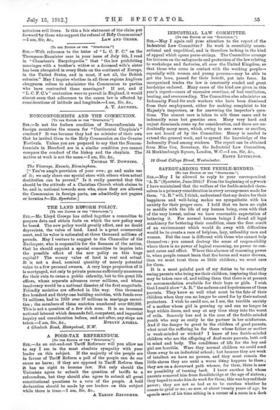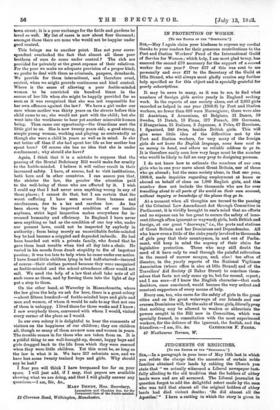SAFEGUARDING THE FEEBLE-MINDED. [To THR EDITOR 07 TEE " SPECTATOR:1
Sin,—May I be allowed to reply to your correspondent "A. R:" (Spectator, June 29th)? From the beginning of mrwork-
I have maintained that the welfare of the feeble-minded them- selves is a primary consideration in every arrangement made for them. "A. R." will, I think, understand that my desire for their happiness and well-being makes me sympathetic with his anxiety for their proper care. I hold that we have no right to meddle with the life of any human being, even with that of the very lowest, unless we have reasonable expectation of bettering it. For normal human beings I dread all legal machinery for bettering their condition, since the first result
of an environment which would do away with difficulties would be to create a race of helpless, lazy, unhealthy men and
women. But the case is different with those who cannot help themselves : you cannot destroy the sense of responsibility where there is no power of logical reasoning, no power to con- nect cause and effect. Where this absence of reasoning power is, when people cannot learn that fire burns and water drowns, then we must treat them as little children; we must care for them.
It is a most painful part of my duties to be constantly seeing parents who bring me their children, imploring that they may be taken care of, and telling them that there is at present no accommodation available for their boys or girls. I wish that I could show "A. R." the sadness and hopelessness of these parents. They know so well what must be the fate of their children when they can no longer be cared for by their natural protectors. I wish he could see, as I see, the terrible anxiety of a mother whose girl is growing up and can no longer be kept within doors, and may at any time stray into the worst of evils. Scarcely less sad is the case of the feeble-minded
youth who may so easily be the partner in her misfortune.
And if the danger be great to the children of good parents, what must the suffering be for those whose father or mother
is weak-minded or wicked? I know of two feeble-minded children who are the offspring of deaf-mute parents, both evil in mind and body. The conditions of life for the boy and girl are horrible. Were they normal children we could send them away to an industrial school ; but because they are weak of intellect we have no powers, and they must remain the little slaves they are until a worse thing happens to them ; they are on a downward path whence, for them, there is now no possibility of turning back. I know another lad whose parents removed him from Sandlebridge at the age of sixteen ;
they hoped to make him do work for them; this was beyondtheir power; they are not so bad as to be careless whether he comes to grief or no ; so now, at about twenty years of age, be spends most of his time sitting in a corner of a room in a dark
town street; it is a poor exchange for the fields and gardens he loved so well, My list of eases is now about four thousand ; amongst these there are none who would not be happier under good control.
This brings me to another point. Has not your corre- spondent overlooked the fact that almost all these poor brethren of ours do come under control ? The rich are provided for privately at the great expense of their relatives. For the poor we make no adequate provision of a proper kind; we prefer to deal with them as criminals, paupers, drunkards. We provide for them intermittent, and therefore cruel, eontrol, when we might provide continuous and kind control. Where is the sense of allowing a poor feeble-minded woman to be convicted six hundred times in the course of her life when she might be happily provided for so soon as it was recognized that she was not responsible for her own offences against the law ? We have a girl under our care whose mother was thirty years on the streets before this child came to us; she would not part with the child; but she went into the workhouse to bear yet another miserable human being. Then came our opportunity—the Guardians sent the little girl to us. She is now twenty years old; a good strong, simple young woman, working and playing as contentedly as though she were a child in years as well as in mind. Is she not better off than if she had spent her life as her mother has spent hers ? Of course she has no idea that she is under confinement; why should she have P Again, I think that it is a mistake to suppose that the passing of the Mental Deficiency Bill would make for cruelty to the feeble-minded. I believe it will rather result in their increased safety. I have, of course, had to visit institutions, both here and in other countries. I can assure you that, the stricter the law, the greater the attention paid to the well-being of those who are affected by it. I wish I could say that I had never seen anything wrong in any of these places ; I cannot do that, but I am certain that the worst suffering I have seen arose from laxness and carelessness, due to a lax and careless law. As has been shown by the improved condition of our lunatic asylums, strict legal inspection makes everywhere for in- creased humanity and efficiency. In England I have never seen anything so had as the condition of one boy who, under our present laws, could not be inspected by anybody in authority ; from being merely an uncertifiable feeble-minded boy he had become a crippled and degraded imbecile. He had been boarded out with a private family, who found that be gave them least trouble when tied all day into a chair. He varied in his moods from dumb stupidity to fits of impotent passion; it was too late to help when he came under our notice. I have found little children lying in bed half-starved—insured of course—their clothes pawned because they were recognized as feeble-minded and the school attendance officer would not call. We need the help of a law that shall take note of all such cases as these, and by forcing them into the light of day put a stop to them.
On the other hand, at Waverley in Massachusetts, where the law gives the help we ask for here, there is a great colony —about fifteen hundred—of feeble-minded boys and girls and men and women, of whom it would be safe to say that not one of them is unhappy. I lived therefor three weeks and I know ; I saw everybody there, conversed with whom I would, visited every corner of the place as I would.
In our own colony it is delightful to hear the comments of visitors on the happiness of our children; they are children all, though so many of them are now men and women in years. The trouble comes in for those who are taken from us. It is a pitiful thing to see Well-brought-up, decent, happy boys and girls dragged back to the life from which they were rescued when they were little children. Yet this must be, so long as the law is what it is. We have 257 colonists now, and we have lost some twenty trained boys and girls. Why should any be lost?
I fear you will think I have trespassed too far on your space. I will just add, if I may, that papers are available showing what we are doing, and that I will gladly answer any questions.—I am, Sir, &e.,
Malty DENDY, Hon. Secretary, Lancashire and Cheshire Soc. for the







































 Previous page
Previous page